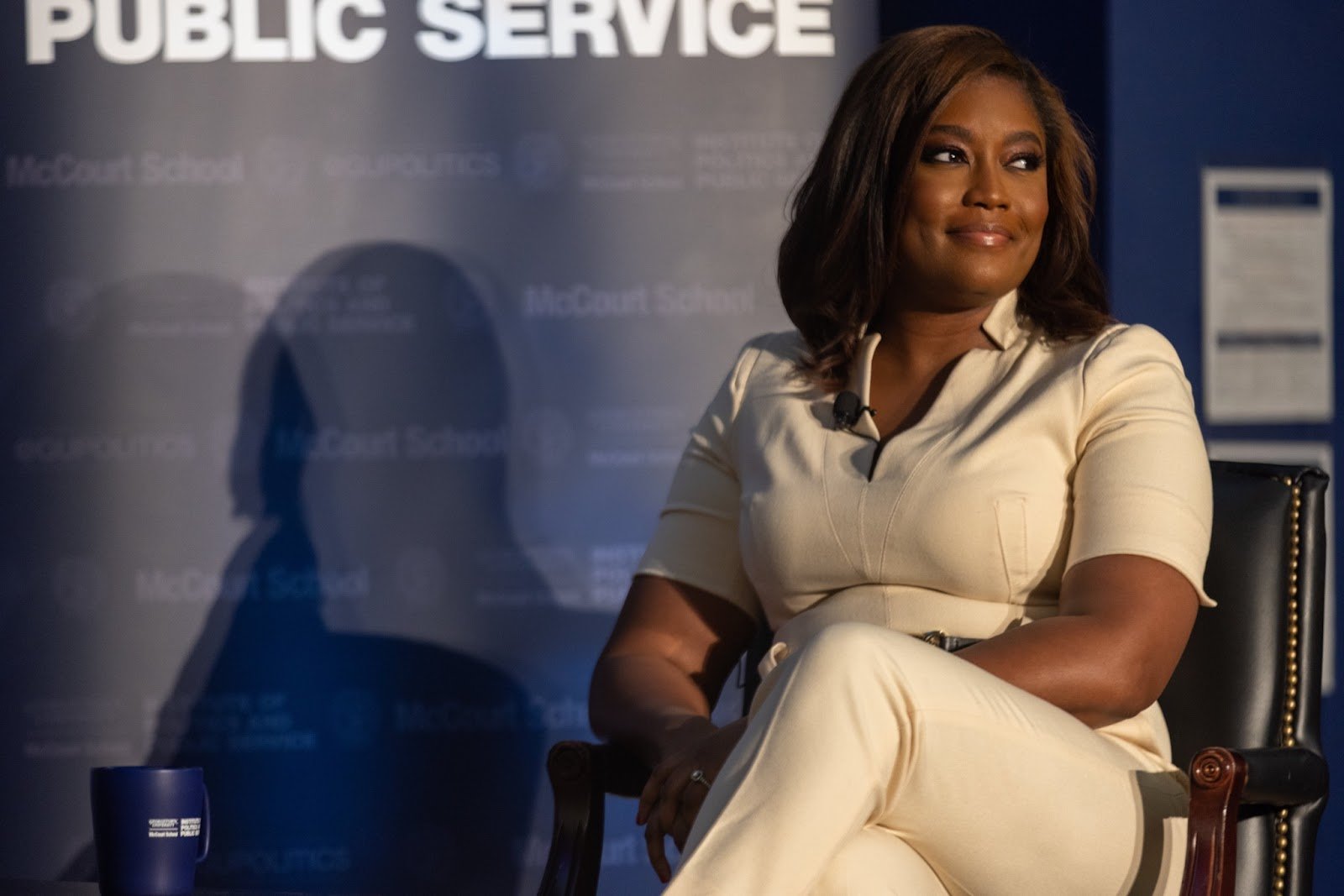Rashida Jones on leadership, power, and the evolution of the news media
Nathan Posner GU Politics
Mia Young: “Girl, you got this.” That is what Rashida Jones, president of MSNBC, tells herself every morning before she heads to work to run one of the largest and most wide-reaching cable news networks in the U.S. In addition to being a leader in a rapidly changing and notoriously grueling industry, Jones faces constant doubt and pressure to deliver as the first Black woman network president in a predominantly white, male industry.
On Wednesday, Jones came to Georgetown’s campus for a discussion about leadership, the media and what it’s like making history. The event was the first in the new Know Your Power speaker series hosted by the Georgetown Institute of Politics and Public Service, which aims to highlight barrier-breaking leaders in politics and the media. The discussion was moderated by Ashley Etienne, the former Director of Communications to Vice President Kamala Harris and a Spring 2022 GU Politics Fellow.
At the event, Jones talked about her journey to being the president of MSNBC, which involved being constantly underestimated due to her race, gender and age. At the end of the day, Jones said, she had to learn to keep her head down and do the work. If she was doing great work and people still doubted or disrespected her, that was a “them problem;” as long as she could prove to herself that she could do her job and do it well, that was all that mattered. Now, Jones hopes that her rise to a leadership position in the media industry will serve as an example to those who look up to her that they can be their full selves and still be a leader; in fact, being a leader necessitates being authentic in your identity and bringing others along with you.
In addition to her personal story, Jones brought her insight about how the news media industry is changing. As a network executive, Jones has a front row seat to how the media has evolved and where it is going in the future. “I think the biggest change has been how people receive the news,” said Jones in an interview after the event. “A lot of the fundamentals remain the same, and they’ve remained the same since the beginning of time, but we’ve got so many new platforms now.” Jones says this has led her to approach MSNBC as a brand that delivers many different types of content rather than just as a cable news network. While MSNBC is constantly working to diversify its platforms — now offering programming on social media, streaming, and in podcast form — Jones emphasized that their goal is always to distribute the same high-quality journalistic product: “Content is at the center, but it gets dispersed in a lot of different ways.”
Some of the most profound changes to the news media and its role in American society in the last few years have been driven by the COVID-19 pandemic. “It was one of those stories, and in national news we don’t get this often, where we were living it as we were covering it,” said Jones. According to Jones, this lived human experience encouraged MSNBC to take a human-centered and compassionate approach to covering the pandemic, which rippled out into the brand’s broader approach to news coverage. Jones said the pandemic brought the role of the news media as a public service to the forefront for her, as she viewed her platform as “really being a place where we could share information, where we could provide expertise from the experts and where we could show empathy.”
Another change that has affected the news media landscape in recent years has been the hyperpolarization of America’s political climate. Often cited as the cable news home of liberal political commentary, MSNBC has been caught up in many conversations about journalistic neutrality. Yet Jones said that even with increasing political tension, her view on this issue has always remained the same: stick to the basics, be transparent and tell the truth. “The world is in a very polarized place, and it’s up to us to ensure that no matter what type of programming we’re covering, it’s all rooted in facts and journalism.”
In light of all of these changes to the news media, Jones finished the interview with some advice for the next generation of journalism and media leaders: “What jobs exist now may be completely different by the time you graduate because the industry is changing so quickly and technology is changing so quickly.” Jones said that what is important for those who want to work in media or journalism is “really focusing on the fundamentals of the job – writing, story selection, being able to talk to people and tell people’s stories.” She also emphasized that being “nimble and flexible” is vital.
Navigating a news media environment that is rapidly moving away from an almost singular focus on cable is certainly no easy feat for a network executive, especially one who is held to standards beyond those of her white, male counterparts. However, Jones sees these changes as an opportunity for those who, like her, may not have previously been able to have their voices heard in such an insular industry: “I think what [these changes] have done is open up so many more avenues for people to pursue media, because it’s not just one thing.”
Mia Young is a junior in the School of Nursing and Health Studies studying global health and government. She is from Washington, DC.

